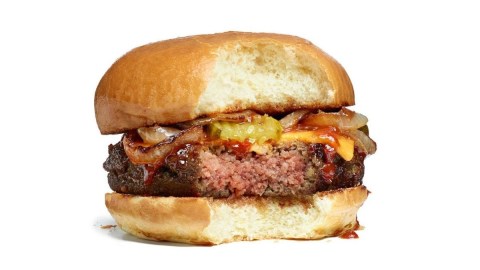Vegan burgers make men feel fuller than beef, study finds

Impossible Foods
- A recent study compared mens’ physiological responses after eating beef and plant-based burgers.
- All men said they felt fuller after eating the plant-based burger.
- Vegan burgers are becoming increasingly popular in the U.S. and abroad, likely due to their health and environmental benefits.
Which do you think would leave you feeling more satiated: a cheeseburger made of good ol’-fashioned meat and cheese, or a vegan burger with tofu? The likely answer is the vegan burger, according to new research.
In a 2018 study — it was published in the journal Nutrients on December 6 — researchers asked a group of participants to eat both of these meals on separate days. The group comprised 60 men — 20 healthy, 20 obese, 20 with type 2 diabetes — all of whom had their physiological responses recorded after each meal.
The results surprised the researchers: All of the men, including healthy participants, reported feeling fuller after eating the vegan burger. Why? It seems to be that vegan meals produce higher levels of beneficial gastrointestinal hormones that are involved in the “regulation of glucose metabolism, energy homeostasis, satiety, and weight management,” the researchers wrote.
Although it’s still unclear exactly what they do, these hormones have been a focus of study among scientists looking for ways to treat obesity and diabetes. According to the new study’s researchers:
“Our results indicate there is an increase in gut hormones and satiety, following consumption of a single plant-based meal with tofu when compared with an energy- and macronutrient-matched processed-meat meat and cheese meal, in healthy, obese and diabetic men…”
Another factor might be the high fiber content of the vegan burger, though the researchers noted that “most acute studies of meals differing in fibre consumption did not demonstrate enhanced satiety.”
The study had several limitations, namely that it examined a small test sample of only men, and it only examined physiological responses after two specific meals — not a habitual diet. Still, the researchers suggested plant-based diets could be useful in treatments for diabetes and obesity.
“Our findings indicate that plant-based meals with tofu may be an effective tool to increase postprandial secretion of gastrointestinal hormones, as well as promote satiety, compared to processed meat and cheese, in healthy, obese, and diabetic men,” they wrote. “These positive properties may have practical implications for the prevention of type 2 diabetes.”
Vegan burgers begin to dominate menus
Veggie and vegan burgers are becoming increasingly popular in the U.S., with restaurants such as McDonald’s, Red Robin, Denny’s, The Cheesecake Factory and even White Castle all now offering meatless sandwich options.
One of the biggest commercial successes in the industry comes from Impossible Foods, a San Francisco-based company that makes the much-talked-about Impossible Burger that browns and bleeds like real red meat. This convincing feature has won over even some dedicated carnivores, many of whom also probably appreciate the health benefits of going meatless: The newest Impossible Burger, for example, contains zero cholesterol, half the fat and fewer calories than a beef burger.
It’s also easy to see how the environmental benefits of plant-based burgers might convince some people to make the switch, considering that raising cattle and other livestock is a major contributor to global emissions.

A 2018 study from the University of Michigan, commissioned by the plant-based burger company Beyond Meat, compared the environmental costs of producing meatless and traditional beef burgers, finding that producing meatless burgers takes:
- 99 percent less water
- 93 percent less land
- 90 percent fewer greenhouse gas emissions
- Nearly 50 percent less energy





